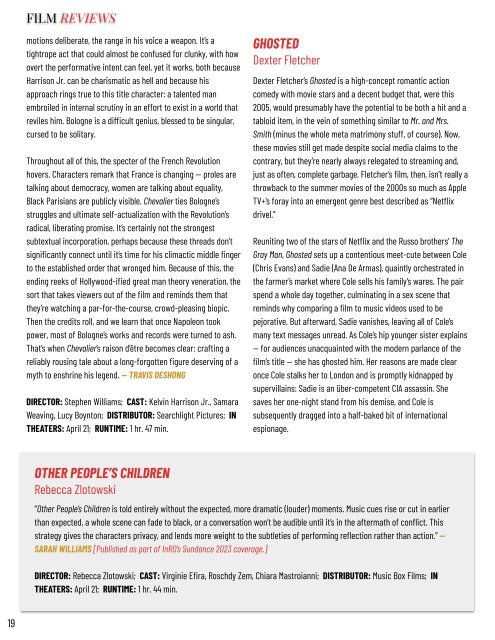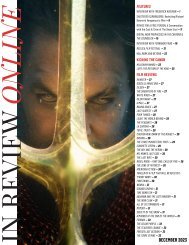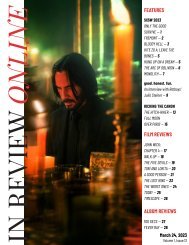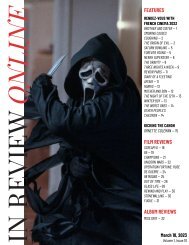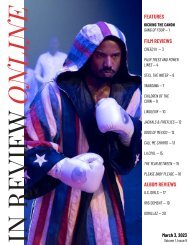InRO Weekly — Volume 1, Issue 16
You also want an ePaper? Increase the reach of your titles
YUMPU automatically turns print PDFs into web optimized ePapers that Google loves.
FILM REVIEWS<br />
motions deliberate, the range in his voice a weapon. It’s a<br />
tightrope act that could almost be confused for clunky, with how<br />
overt the performative intent can feel, yet it works, both because<br />
Harrison Jr. can be charismatic as hell and because his<br />
approach rings true to this title character: a talented man<br />
embroiled in internal scrutiny in an effort to exist in a world that<br />
reviles him. Bologne is a difficult genius, blessed to be singular,<br />
cursed to be solitary.<br />
Throughout all of this, the specter of the French Revolution<br />
hovers. Characters remark that France is changing <strong>—</strong> proles are<br />
talking about democracy, women are talking about equality,<br />
Black Parisians are publicly visible. Chevalier ties Bologne’s<br />
struggles and ultimate self-actualization with the Revolution’s<br />
radical, liberating promise. It’s certainly not the strongest<br />
subtextual incorporation, perhaps because these threads don’t<br />
significantly connect until it’s time for his climactic middle finger<br />
to the established order that wronged him. Because of this, the<br />
ending reeks of Hollywood-ified great man theory veneration, the<br />
sort that takes viewers out of the film and reminds them that<br />
they’re watching a par-for-the-course, crowd-pleasing biopic.<br />
Then the credits roll, and we learn that once Napoleon took<br />
power, most of Bologne’s works and records were turned to ash.<br />
That’s when Chevalier’s raison d’être becomes clear: crafting a<br />
reliably rousing tale about a long-forgotten figure deserving of a<br />
myth to enshrine his legend. <strong>—</strong> TRAVIS DESHONG<br />
DIRECTOR: Stephen Williams; CAST: Kelvin Harrison Jr., Samara<br />
Weaving, Lucy Boynton; DISTRIBUTOR: Searchlight Pictures; IN<br />
THEATERS: April 21; RUNTIME: 1 hr. 47 min.<br />
GHOSTED<br />
Dexter Fletcher<br />
Dexter Fletcher’s Ghosted is a high-concept romantic action<br />
comedy with movie stars and a decent budget that, were this<br />
2005, would presumably have the potential to be both a hit and a<br />
tabloid item, in the vein of something similar to Mr. and Mrs.<br />
Smith (minus the whole meta matrimony stuff, of course). Now,<br />
these movies still get made despite social media claims to the<br />
contrary, but they’re nearly always relegated to streaming and,<br />
just as often, complete garbage. Fletcher’s film, then, isn’t really a<br />
throwback to the summer movies of the 2000s so much as Apple<br />
TV+’s foray into an emergent genre best described as “Netflix<br />
drivel.”<br />
Reuniting two of the stars of Netflix and the Russo brothers’ The<br />
Gray Man, Ghosted sets up a contentious meet-cute between Cole<br />
(Chris Evans) and Sadie (Ana De Armas), quaintly orchestrated in<br />
the farmer’s market where Cole sells his family’s wares. The pair<br />
spend a whole day together, culminating in a sex scene that<br />
reminds why comparing a film to music videos used to be<br />
pejorative. But afterward, Sadie vanishes, leaving all of Cole’s<br />
many text messages unread. As Cole’s hip younger sister explains<br />
<strong>—</strong> for audiences unacquainted with the modern parlance of the<br />
film’s title <strong>—</strong> she has ghosted him. Her reasons are made clear<br />
once Cole stalks her to London and is promptly kidnapped by<br />
supervillains: Sadie is an über-competent CIA assassin. She<br />
saves her one-night stand from his demise, and Cole is<br />
subsequently dragged into a half-baked bit of international<br />
espionage.<br />
OTHER PEOPLE’S CHILDREN<br />
Rebecca Zlotowski<br />
“Other People’s Children is told entirely without the expected, more dramatic (louder) moments. Music cues rise or cut in earlier<br />
than expected, a whole scene can fade to black, or a conversation won’t be audible until it’s in the aftermath of conflict. This<br />
strategy gives the characters privacy, and lends more weight to the subtleties of performing reflection rather than action.” <strong>—</strong><br />
SARAH WILLIAMS [Published as part of <strong>InRO</strong>’s Sundance 2023 coverage.]<br />
DIRECTOR: Rebecca Zlotowski; CAST: Virginie Efira, Roschdy Zem, Chiara Mastroianni; DISTRIBUTOR: Music Box Films; IN<br />
THEATERS: April 21; RUNTIME: 1 hr. 44 min.<br />
19


